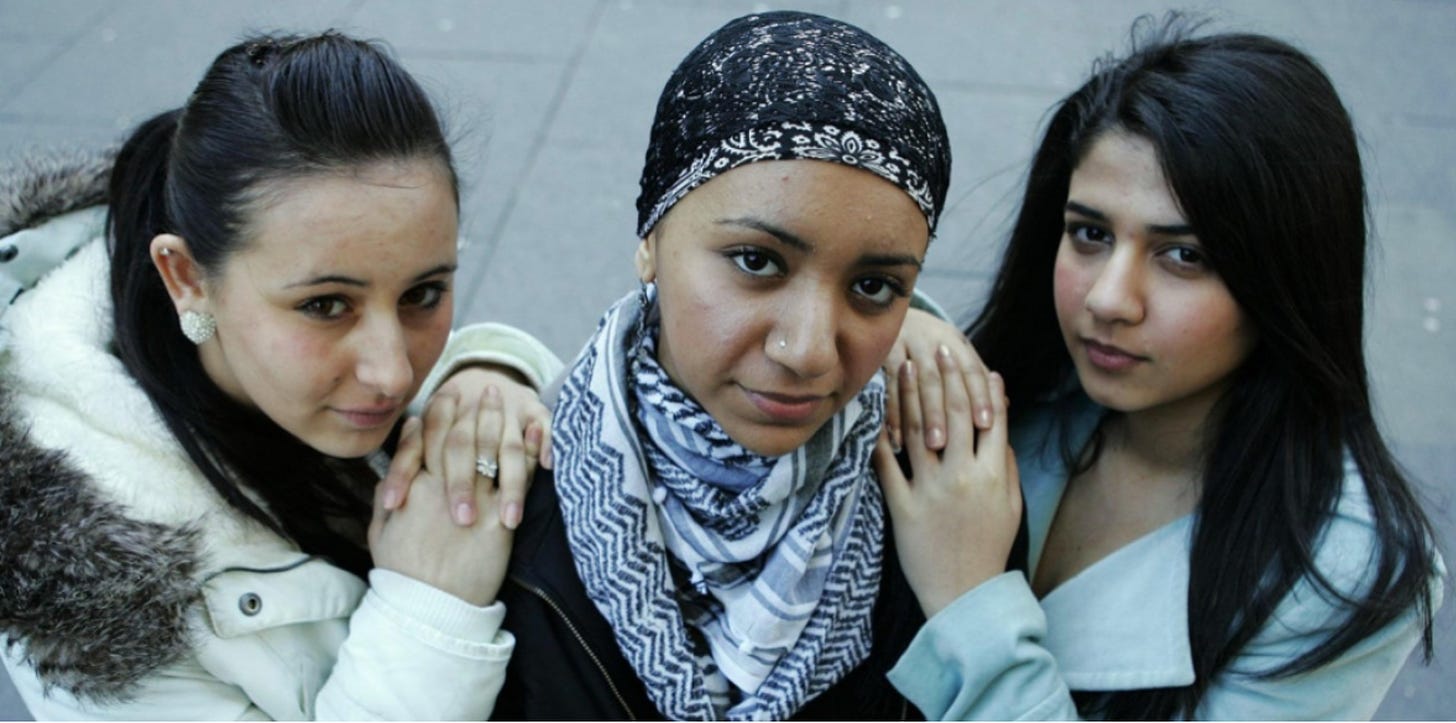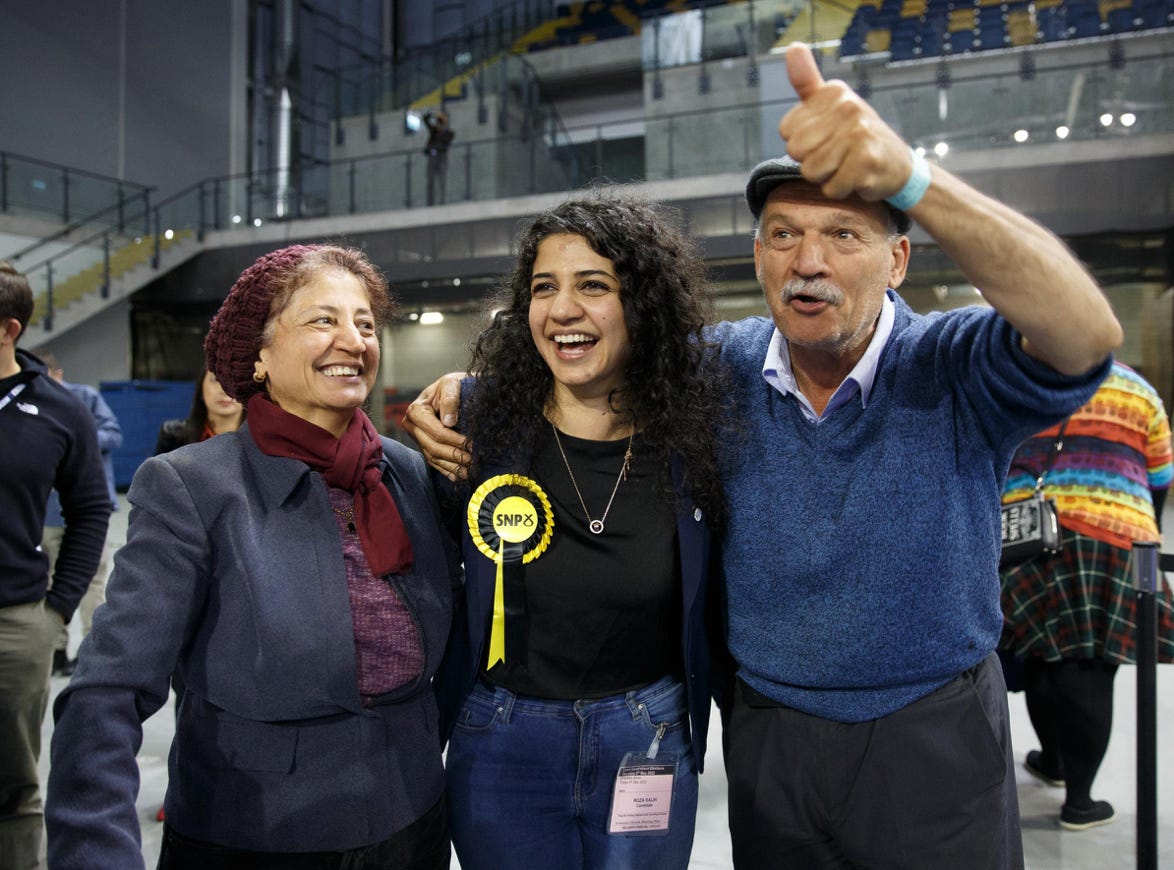Looking to the future: Roza Salih speaks
A new series on the SNP, independence and the shifting terrain in Scottish politics
Over the next four weeks as the SNP leadership contest plays out, Independence Captured will carry a range of interviews reflecting on the Sturgeon era, the future of the party and where Scottish politics might go next. The views expressed in the interviews do not necessarily reflect my own.
Roza Salih, I am delighted to say, will kick the series off. Roza is the first former refugee to be elected to political office in Scotland. She came to the country as a young girl, leaving Kurdistan in northern Iraq to seek asylum. With an inspirational track record of campaigning and activism, going back to the Glasgow Girls, she brings a much needed perspective. Over the years we have worked together on a range of issues, not least independence. Catching up with Roza rekindled memories of 2014 as we explored her political objectives and where she thinks the SNP should go next.
Jonathon Shafi (JS): Roza, thank you for speaking to Independence Captured. I’d like to start by asking about your own entry into politics and what motivates you. Can you give us a sense of how, and why, you got involved?
Roza Salih (RS): Firstly, I just want to thank you for this opportunity to give me this platform to speak and express my views about the current political situation. I'm sure many people are aware of my story as one of the Glasgow Girls, which I could talk about for a long time! I went to Drumchapel High School where seven girls, myself included, organised a campaign against dawn raids, deportation and detention after our friend Agnesa Murselaj was detained by the Home Office. We took the issue to the streets and to the parliament. We challenged the First Minister - at that time Jack McConnell - on the issue. We won support across the political parties. It was a defining time in my life. And it made me realise that we can change things if we are organised and determined.
In short, I came to this country as a refugee and campaigned for refugee rights. Fundamentally that is my passion. Migration policy and improving the immigration system will always be central to my political activity.
I joined the SNP as a result of my support for independence. My view is that it is the party in the strongest position to deliver this goal. Many people in Scotland are in favour of independence because they believe it will help to achieve equality, fairness, a better country and by extension a better world. And that's what we want to achieve. I want to see better living standards for working-class people. I want to see more public ownership of our resources, so that they can benefit the people of Scotland. Of course, there are problems. But I think independence offered people hope, and a route for socialist ideas to flourish. That is how the case for it can be built.
That said, had it not been for the independence issue, my natural affiliation might have been with the Labour Party. In fact, being very much on the left, perhaps a socialist party. The prospect of independence and the experience of the referendum convinced me to join the SNP in 2015 instead.
JS: Now that Nicola Sturgeon has resigned and the SNP is having a debate about the way forward, what would you like to see the party do more? And what do you think could be improved?
RS: For a start, I would like to see more radical policies implemented by our next leader. And whoever that is going to be, I want them to implement new ideas that go beyond trying to please the profiteers and the establishment. I would much prefer that we try and implement policies that actually impact people’s lives and benefit working people in particular.
With this kind of approach, I think support for independence can be built. Of course, many supporters want independence right away. And I am one of them. I want a referendum and want it now. But the reality is, we have to work on convincing more people of its merits. We have to make a real shift in the polls. I think the kind of left-wing policies I support - if implemented - would better engage with people who are undecided on the issue. People need to see that life can be changed for the better, to become inspired. I want to see a National Care Service that works. I want to see us move ahead with plans for a Green New Deal. I want to see real action on eradicating poverty, not just more talk. And what’s more, I want to see us talk about Scotland becoming a republic in the future.
So I'm hoping the next leader can become a positive beacon for a strategy along those lines so that we can build our independence movement, and in the end, move towards a successful referendum. The Yes movement needs to work together on these goals.

JS: A lot of this reminds me of the approach many of us took in 2014, and had some real success with. Back then there was a sense that people felt agency over their future. How do you feel about democracy inside the SNP? There have been a number of conference votes that passed only to be left on the shelf.
RS: I'll be honest with you. The National Energy Company is one example which I found really frustrating. I was very energised when it was announced, and personally very unhappy when it was dropped. That was the kind of policy that the Scottish people could really have gained from. We have achieved in some areas, but we could be doing so much more.
Not only did the National Energy Company fall by the wayside, we have our renewable wind energy being handed over to the likes of BP and Shell. They will take in massive profits, at the expense of working people. As a socialist, I find it unacceptable. You see where people are today, and I see the problems first-hand as a councillor. They can’t pay their bills. We have a massive problem with fuel poverty. We have people literally going without food so their kids can eat. Meanwhile, the big energy companies are making historic profits.
So where do we come in? We have to be arguing for solutions that put people first. Especially during a cost-of-living crisis. If we don’t stand up for people now, why would they trust us on independence? I hope the next leader can tackle some of these matters head-on and that we can get into a proper policy discussion. I think this should be influenced by the grassroots of the party, who are on the ground and know how hard life is at the present moment. I hope the new leadership listens to left-wing voices that can deliver real change. This way we can actually gain support for independence, and the confidence needed to win a referendum in the future. We need to make an impact now and show we have a big vision to take Scotland forward.
JS: Lastly, is there anything you would like to see more of in the SNP leadership debate?
The discussion on social media in particular has become very toxic. We need to focus on the major issues that people are struggling with on a daily basis. We need to think about how we can connect with people’s concerns around wages, poverty and inequality. For example, teachers are on strike right now. They're asking for a 10% pay rise. We should be discussing issues like that, and working with the broader trade union movement. That means shifting gears and being honest about the need to do more for people, and with people, to raise living standards.
After all, politicians said we would “build back better” after the pandemic. Well, let’s make sure those are not just words.




